- Romance
- Rita, The Computer Forensics Tech
Note: You can change font size, font face, and turn on dark mode by clicking the "A" icon tab in the Story Info Box.
You can temporarily switch back to a Classic Literotica® experience during our ongoing public Beta testing. Please consider leaving feedback on issues you experience or suggest improvements.
Click hereIt was just daylight when the line of Union Infantry took their positions on the north side of the pasture in middle Tennessee near Nashville. Behind the infantry, the artillery batteries had wheeled their cannons into place and were in the process of loading their guns.
The Union General could see that the Confederate troops on the other side of the pasture were doing the same thing. The Confederate line stretched across the open field for almost a quarter of a mile, a quarter of a mile of soldiers in gray with their rifles at the ready, and behind them, six cannons all pointed at his infantry.
He knew the cannons would fire first, the iron cannon balls with delayed fuses hurtling toward his troops. Some would make it to the ranks of blue before exploding and then killing or severely wounding any soldier within a hundred feet. The cannon balls that didn't make it that far, and some would be aimed with that intention, would skip over the soil of the pasture and then plow through the massed troops before exploding.
Men would be laid low, either dead or dismembered by the six and twelve pound balls of death before they hit the ranks of the artillery and exploded. His own artillery was taking aim to cause the exact same effect.
It had all been planned in conferences before the battle, planned down to the last detail of which cannons on either side would fire first, which would be destroyed, how many men would fall when each volley of rifle shots was fired, and how fast the opposing armies would close on each other.
The planning conferences were required because the cost of filming the battle prohibited more than one filming session. There were around three hundred extras on each side of the pasture, three hundred men in authentic uniforms and carrying reproductions of Civil War Era firearms. CGI would expand that three hundred to a thousand on each side in order to save cost.
Most of the rifles were just prop guns, but two Civil War reenactment groups were also participating and would be the extras used for the close up shots. They were armed with fully functioning rifles and paper cartridges filled with black powder.
The cannons behind the troops were mostly fiberglass mockups of the real thing, but there were several functional cannons on each side of the battlefield. Those cannons would be loaded with black powder charges wrapped in aluminum foil and designed to produce the same level of sound and smoke as similar pastures and fields had witnessed in 1864. The cannon balls would be added later by the CGI artists. Those cannons were owned and manned by men from Civil War reenactment groups.
When the cameras were all in place, the director gave the command over the PA system for the cameramen to begin filming. Ten seconds later, the reenactors fired the first of the cannons on the Union side of the field. A few seconds later, the reenactors on the Confederate side likewise touched off the cannons for which they were responsible.
For five minutes, the pasture was clouded in white smoke as cannons kept firing and the cameras recorded the simulated landing of cannon balls among the troops. The stunt men wearing the appropriate uniforms either fell when the small charge beside them blew soil and grass into the air, or staggered away holding an arm or crawled away. CGI would take away part of an arm or leg during postproduction.
Close-up shots of men with those injuries would also be added during postproduction. Those injuries would be constructed by the makeup artists employed by the production company and would show the horrible amputations complete with mangled flesh, ragged bone ends and spurting blood. The screams of men in agony would be added later by the Foley artists in a sound studio.
When the director spoke on the PA system again, it was to start the infantry action. Both sides then erupted in gunfire that filled the space between them with more white smoke. After the first volley, both sides began to close the distance between them, the second rank moving up past the first and firing, then staying in place as the third rank moved up to pass them. This leapfrogging maneuver closed the gap by about ten feet once every minute or so.
The Union advance would continue until the Confederate general gave the order to retreat. The men in gray would turn around and run away from the pasture leaving their dead and wounded where they fell. The two lines were about fifty yards apart when the director gave that order.
When all the men in gray uniforms had run back to the trees that bordered the pasture, the director picked up his microphone.
"OK everybody, that's a wrap. I think we got everything we need so turn your weapons in to the armorer and your uniforms to property."
At that statement, both sides began walking back to the cluster of trailers and tents that housed the production company. The supposedly dead and wounded lying on the battlefield stood up went with them.
The director was speaking with one of the cameramen when there was a shout from the center of the pasture. He looked up and saw one of the extras standing beside a man on the ground and waving his arms.
The local EMT's who were there in case one of the actors was injured or fell victim to heat stroke on the hot day had also heard the shout and saw the man waving his arms, and they were in their truck and driving toward the two men. The director, thinking the man had just fallen wrong, turned back to finish his conversation with the cameraman.
That conversation lasted for about another minute before the EMT truck came racing back across the field with the lights flashing and the siren screaming. He turned to one of his assistants and told him to find out what had happened. The assistant began walking toward the man who had sounded the alarm.
He came back to the director with that same man, pointed to the director, and said, "Jimmy, tell Mr. Arnold what you told me".
Chuck Arnold, the director of the battle scene, looked up at the man and smiled. He figured it was just a routine set injury. Those things always happened when there were extras involved. Most extras would do what they'd been instructed to do, but a few, thrilled to be in a real movie, would try to enhance their small role. In the process, they'd fall too hard or roll around in faked pain. Most set injuries were simple things -- a sprained ankle or a bruise or cut caused by a stick or rock on the ground. That's why the EMT's were there. The reward for the would-be actor was that part of the scene would be cut during editing.
Chuck was a little concerned because of the lights and siren, so he told the cameraman he'd catch up with him later and then turned back to the man.
"Jimmy is it? OK, Jimmy, what happened?"
Jimmy, obviously shaken, began talking fast.
"Carl and me are in the reenactor group in Franklin and we do this all the time. When everything was over, I seen that Carl wasn't gittin' up. I went over to see what was wrong and there he was bleedin' from a hole in his chest. I think he got shot cause the hole looked like the hole in every deer I've ever shot. He wasn't breathin' very good either. When the EMT's got there, one of them started doing CPR on Carl and the other put a needle in his arm and connected it to a plastic sack of something. I heard one of them say he didn't think Carl was going to make it."
Jimmy's voice changed from grief to anger then.
"What the hell am I supposed to tell his wife? We was just suppose to come out here and get a couple hundred dollars for doin' what we do on the weekends for fun. Nobody was supposed to get killed. Don't you guys check to make sure there's no live rounds? We do that twice by two different people before every reenactment."
Chuck was frowning after hearing that. On top of the stress of getting the battle scenes in one take and dealing with the locals who thought this was their chance to break into acting, this was the last fucking thing he needed.
It had rained for two days the week before and he'd had to wait until the ground dried out so he wasn't shooting men slipping and siding through mud. The lead character of the movie, the man who played the Confederate General, had spent the time in his trailer with a few bottles of bourbon and two of the makeup girls. When the ground finally dried out, the he was still half drunk and the makeup girls had been fucked so many times they had trouble walking.
He'd been involved in another movie where a stunt man had been killed. The police had shut down the movie set for three weeks and it had cost the producer almost a million dollars before filming got underway again. That had just been an accident that was easily proven to be such. This, even if this one wasn't the fault of the production company, it probably was the end of the movie. The producer's would cancel everything to avoid the publicity and he'd be out of a job.
Chuck turned to his assistant.
"Take Jimmy here to my trailer until the police get here, then take some prop guys and rope off the area around where this happened. The police will want it as undisturbed as possible."
The assistant nodded, took Jimmy by the arm, and took him away.
}|{
I'm Mack Mason, the homicide detective from the Nashville PD who was assigned to the case and that was the story I got after talking with the uniforms who had responded to the EMT call for the police and after a short conversation with Jimmy and Mr. Arnold.
Carl Anderson had been pronounced dead as soon as the doctor at Mercy had examined him. His body was now in the morgue and Harry James, our coroner, was trying to figure out what killed him. Harry knew it was a gunshot, but he hadn't yet worked his way down to retrieve the bullet. I was waiting on that information because it would determine how I went about my investigation.
Even though most of the rifles used during the battle scene were fakes, there were still about fifty in the hands of experienced re-enactors. It was possible a live round had found it's way onto the set, had been accidentally loaded during the mock battle, and had killed Mr. Anderson. That was about the only explanation that came to mind. It wouldn't be the first time someone on a movie set was killed by the unplanned discharge of a firearm.
I figured once Harry had the bullet, Jack Rawson, the crime lab guy who does all our firearm identification and matches one bullet to another or to a particular gun would be able to tell me what kind of gun to look for.
That was already going to be difficult. The director had made Jimmy stay behind, and the actual cast and crew of the movie was still there, but the extras including the other reenactors had all left. I'd have to track them down one at a time and talk to them.
Since I was already at the scene, I found the set armorer and had a talk with him about set safety precautions where firearms were concerned. As soon as I asked him what he thought happened, he started denying any involvement in the accident.
"Detective Mason, you can search every goddamned trailer and tent on this goddamned set and you won't find a single live round. My guys all know I'd fire their fucking ass on the spot if they even thought about bringing even one live round onto one of my sets. It must have been somebody else. Why don't you go talk to the pyrotechnic techs? They're a bunch of fucking crazy bastards who love blowing shit up. I wouldn't put it past them to slip a live round into somebody's cartridge box."
I said if he and his crew were doing their job, they should have found that live round and the fact that they hadn't made me wonder if he or one of his crew might be responsible. That settled him down a lot.
"Look, Detective Mason, my standing procedure is any real firearms on a set are in my possession until right before the shoot. Any firearm gets checked for a load or loads before the actor gets it. It has to either be empty or if the shot calls for it, a blank designed to make noise and smoke. One of my guys makes that check when he hands the firearm to the actor. I make a second check before the camera starts rolling.
"We couldn't hold on to the rifles used by the re-enactors since the firearms were theirs, but I checked every rifle the reenactors brought by rodding the barrel and checked to make sure every cartridge box was empty when they were lined up and ready to go on the set. Once that was done, I personally gave each of them twenty paper cartridges that my guys had put together.
"All those cartridges were was just black powder with a little flash powder in a paper tube twisted at both ends. When they were on the set and before the cameras started rolling, my three guys made the same checks before giving them the OK to load the first charge.
"There were a few guys who brought revolvers with them too, and the drill was the same. We checked each one for empty chambers and barrels before anybody went on the set and then watched each guy as he loaded the black powder in individual tubes I gave him, capped it with a cardboard wad and then rammed it home.
"The long and short of it is unless the guy brought his own bullet and loaded it on top of the powder charge we gave them, there's no way any of the re-enactors killed that guy, and they were the only ones on the set with actual firearms."
I asked him if he had a list of the real firearms that were on the set and he shook his head.
"There didn't seem to be a need. They belonged to the re-enactors, not the prop department. They also all used the same black powder and percussion caps so there was no need for any different ammunition."
I asked him if anyone else on the set could have had a firearm and he shook his head.
"I suppose that's always a possibility, but we do everything we can to prevent that from happening. Every person who comes on the set has to go through security. Security doesn't pat down the regular cast and crew or anything like that, but they're told that bringing any weapons on the set will result in immediate termination.
All the regular cast and crew already know that. The extras are asked if they have any weapons of any type and anything they're carrying is searched. Our security guys are all former military or former police officers, so they know what to look for. I don't think anybody could get a weapon on the set."
}|{
My next interview was with the director. I asked him if he'd noticed any thing unusual and he smirked like he thought I was an idiot.
"Sorry, Detective Mason, but with that many people running around and all the noise and smoke, all I was looking at was what the main characters were supposed to be doing. One of the assistant directors or cameramen might have, but I doubt even that. Scenes like this are pretty much controlled chaos. For it to work, everybody has to concentrate on doing their part and they don't have time to do much looking around."
I asked him for a list of everybody who was on the set at the time of the accident. He said I'd have to get that from the production secretary. I then told him I needed all the footage of the battle from every camera he had running. He hesitated then.
"Uh, which do you want, the film or the digital? We're shooting in both. The digital gives us instant dailys but the film gives the movie a softer look people expect to see in a theater. The film won't be developed before tomorrow morning and unless you have a seventy-millimeter projector, you probably can't watch them anyway. The digitals will be available in about an hour after we convert them to M-disk. You should be able to read them on about any relatively new DVD or Blue-ray player. This scene was about fifteen minutes long and I had ten cameras running. With camera checks, that's about three hours of video. You'll have a lot to go through.
"One thing though. What you'll get is raw video with no editing. The producers don't want that video getting out into public view and then on Youtube or Facebook or Twitter. I'm sure you'll give me your word that that won't happen, but understand, if it does, the producers will sue you and your police department and probably the city of Nashville and state of Tennessee."
I then asked him if he knew Mr. Anderson and he shook his head.
"Casting just made contact with a few re-enactment groups and picked the extras from them. Somebody in Casting might know him, but I doubt it."
Given the number of extras on the set, I doubted it too, but I still went to talk to the casting department. Nobody there knew Mr. Anderson, but they did have something I was going to need. They had the name, address, next of kin, and phone number of every person appearing in the movie, both regular cast and the extras.
On my way off the set, I stopped by the production office and got a list of everybody besides actors and extras who were on the set. I doubted any of them could be responsible for the accident, but I still had to eliminate them.
The stop I made before going back to my desk at the station was to deliver notification to Mr. Anderson's wife. It was likely that one of the reenactors had already told her, but it was department policy that the official notification come from the homicide detective assigned to the case.
According to the list the casting department gave me, Mr. Anderson was thirty-seven and his next of kin was his wife, Susan Anderson. The small ranch about ten miles from the city limit looked like it would be a great place to live. It was surrounded by trees and there was a small stream about a hundred yards west of the house. The bridge over the stream told me that stream was probably on Mr. Anderson's property.
It was the kind of place I'd often thought about retiring to. I like to fish, and that stream looked big enough to hold some fish. The only thing I hunt are people who commit murder, but it looked like those woods would be full of rabbits and squirrels. I thought I'd enjoy sitting on my back deck with a beer and watching the wildlife.
The woman who answered my knock was about Mr. Anderson's age, give or take. She wasn't wearing any makeup and it was obvious she'd been crying because her eyes were red.
I introduced myself and when I started to tell her why I was there, she cut me off.
"Detective, I know why you're here. Jimmy called me and told me what happened. Come in because I have some questions for you."
Mrs. Anderson was short and to the point.
"Do you know who did it?
I said, not yet, but that I wouldn't stop until I found out. Then she asked me if I knew why her husband had been killed. That was my opening to ask her some questions.
"Missus Anderson, I won't know why until I find out who did it. You can help me do that. Do you feel well enough to tell me about your husband? If you don't, I can come back later."
Mrs. Anderson said she wasn't all right, but that if it would help she'd answer all my questions. My first question was did she know of anyone who might want to hurt her husband. She frowned then.
"Detective Mason, my husband owns a construction company he took over when his dad retired. Mostly, he builds really expensive houses and small business offices, and he has to quote against a lot of other contractors. I know at least one of them lost a half million-dollar house to my husband, and I know he wasn't happy about it. He came over one Sunday afternoon two weeks ago and accused my husband of hiring illegals so he could bid the job for less. Carl never hired illegals to do anything. He thought Americans should have those jobs.
"He also thought a man should give him a fair day's work for a fair day's pay. I know he fired two carpenters last week because they came to work drunk. There are probably more people who weren't happy with Carl, but those are the latest that I know of."
I asked Mrs. Anderson if she had the names of those people and she said she'd have to look at her husband's records and get back to me. Then I asked her two questions she probably didn't want to hear, but questions I need her answers for.








